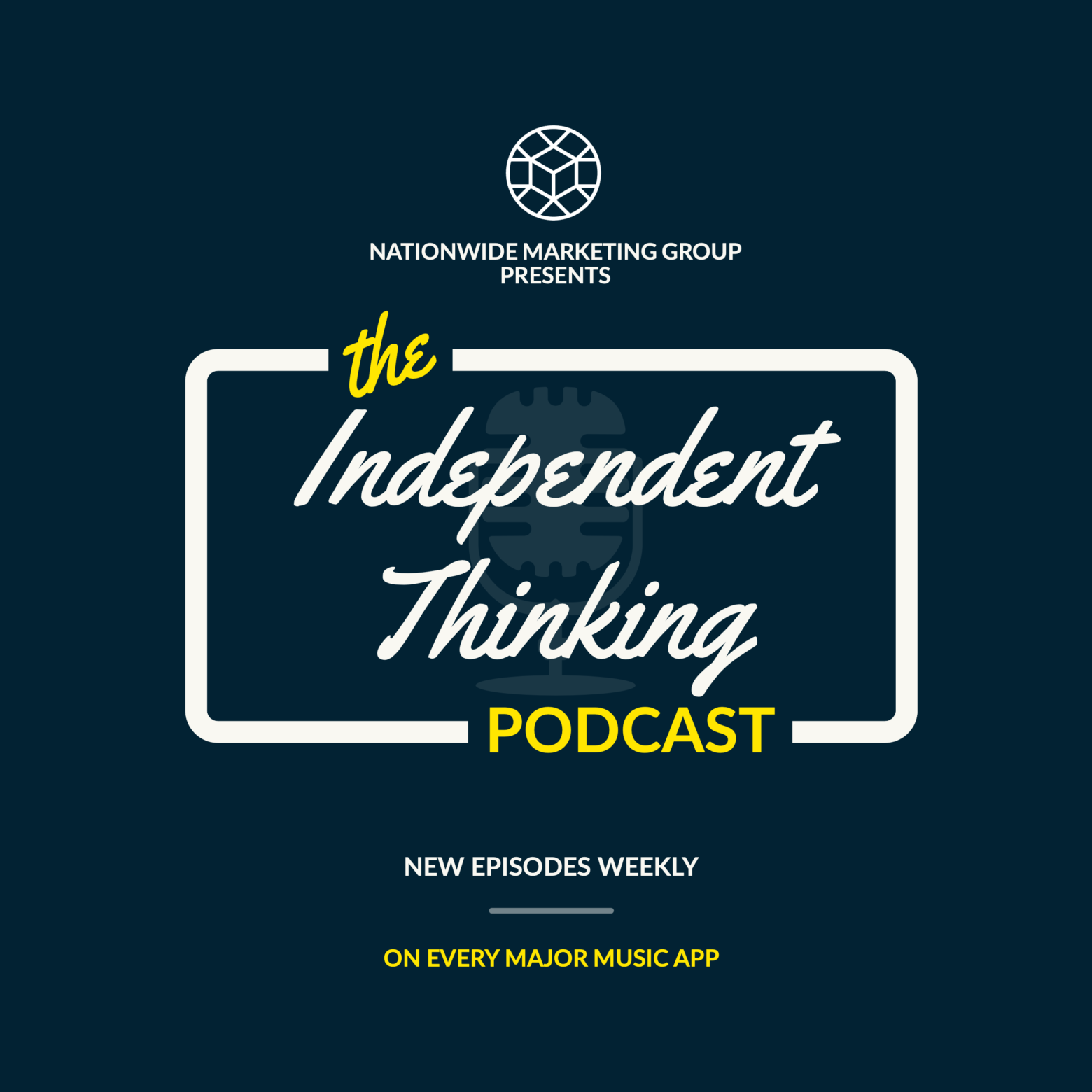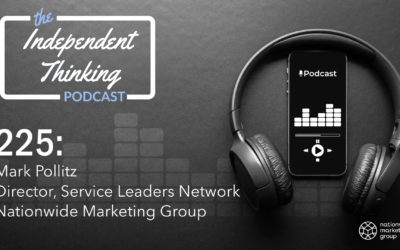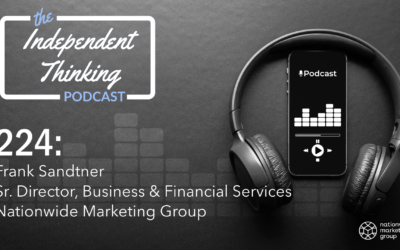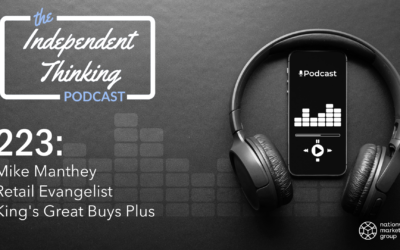Steve Mahler is the director of Point of Sale (POS) for Nationwide Marketing Group and the perfect guy to talk to if you’re interested in learning everything there is to know about POS. He spoke with us about how POS has evolved over the years and the many benefits retailers can realize by utilizing the right POS for their business.
Rob Stott: All right. We’re back on the Independent Thinking podcast and another edition from home. Mr. Steve Mahler, director of POS. Man, appreciate you joining me, even you’re down there in Texas, right? Where in Texas?
Steve Mahler: Definitely in Dallas. Yep, yep.
Rob Stott: All right, well you got a Dallas guy and a Philly guy on the phone together. We’ll try to make this entertaining, to say the least.
Steve Mahler: Yeah, yeah. I noticed through all of this crazy pandemic situation, you’re going for the full beard there.
Rob Stott: Yeah.
Steve Mahler: I haven’t seen my barber in a while and for me, this is long, right, because I’m used to my military cut, so I’m struggling.
Rob Stott: Well the thing is, see I’m working from home anyway, so this is just, I’m just rebelling at this point. I don’t go to an office, I can shave when I want to. I’m just deciding that now, we’re in quarantine, so I’m not doing it. I’m not doing it until we’re done. If I grow a beard down to here, that’s what it is.
Steve Mahler: I love you free spirits. I live in a house with a principal. I have to raise my hand and can I speak? Can I say something now? Go cut, go shave, go cut your hair. I’m definitely still in boot camp over here.
Rob Stott: Oh, that’s awesome man. Well, we’re all making do and I appreciate you finding some time to call in and chat about a really cool topic. One that I know we’ve talked about it. We don’t, I say this, you probably feel the same way, but it doesn’t get enough attention and one that is extremely important to retail today. That’s evolved a lot, so I am excited to dive into it with you.
Steve Mahler: Most definitely.
Rob Stott: Just to start, point of sale, dive into it, explain it to the uninitiated out there. What it means in 2020 and how it’s evolved. I think when people think about point of sale, they’re like, all right, well it’s the cash register, the checkout point. Is that all it means? What new nuances have emerged over the last decade or so?
Steve Mahler: Yeah. Great question. So, essentially a POS is basically a retailer’s organizer, right? It manages inventory coming in and going out of their retail store. When you think about POS and you think about inventory organization, consistency is always key for a retailer. It’s important that the retailer, the POS manages every aspect of their business. Everything from delivery to a promotional giveaway sponsor to damaged items discovered, right down to shipments received. They want to make sure that all of these things are a portion of their POS software. When they’re looking at that one greater aspect to the POS system is they can now analyze all of that data that they’re getting from their POS software.
When they’re able to analyze that, they could see exactly where their revenue generators are, and make better buying decisions based off of that to actually stay in the game a lot longer. Just like the prediction of you don’t have a website in this day and age, your business is going to go, you’re going to go out of business within five years. You could start looking at POS software in that same realm. The basic stuff that, I mean, one greatest aspect that I’ve seen change over the last decade is being cloud-based, right? A lot of these, just like you said, a lot of these old-time POS software that are legacy that you saw there, all you thought about was a cash register, right?
Rob Stott: Yeah.
Steve Mahler: No more. Now, when you’re moving to cloud-based, you’re moving to more of a mobile system. That’s the biggest part of the change that’s happened over the last decade. Everything has become more mobile and that makes it a lot easier for retailers to move faster, make better adjustments within their store. That’s moving away from the old legacy system and the cash register items that we’ve seen in the past. In old time you go to a restaurant, you go up, you pay for your food and you walk away. It’s no more. Nothing happens like that anymore. Now, all you need is a web browser for you to actually make a purchase on. You could do deliveries and everything from a mobile device, right? Your sales reps on the floor are more mobile than they are anything else. It gives them the ease of use to do that now. That’s the biggest change that I’ve seen in the last decade to really touch POS.
Rob Stott: It sounds, I mean, well, two things. I’m going to start by saying, just going, a point you touched on there about how you can use these systems to see what’s doing well in your store and pick and choose your product mix and stuff like that. Kind of reminds me of days in publishing. When we track how websites perform, you could look at the back ends of websites-
Steve Mahler: Yeah.
Rob Stott: This may be too nerdy for some people, but I like it, so I’m going to dive into it.
Steve Mahler: I love it too.
Rob Stott: You can look at taxonomies of websites and what people are reading, whether it’s, you could be talking about a trade publication or a news media website, you have it broken down by whatever categories, however, you have your website broken down. You could see where people are reading stories from. Based on that data we would shape our content strategies and the type of content we would produce. Kind of feels the same sort of way I guess in terms of how POS is, is that you can see what’s doing well, and lean into that. You can exponentially increase the success of what’s performing well.
Steve Mahler: Yeah. Yeah. While you’re on that, I mean, yeah, that ties in directly to the eCommerce side of things for POS, right? When you’re looking at the eCommerce side of things for a POS portion, you started looking at the website and the POS system being integrated. That they’re working together. We’re seeing this huge pandemic happen right now and it’s killing our economy, but at the same time, it’s more so that it’s definitely a high, high level where you definitely need to have your POS and your website communicating, because that opens up levers for you that you’ve never had before, which is called Google shopping. If you don’t have real-time data that shows your inventory immediately on your website, which comes directly from your POS software, you can’t use tools like Google shopping, which is definitely impactful right now when you’re following safety protocols from the government. It definitely makes it a lot easier for consumers to get products like furniture, bedding, any of that product directly from a retailer in this day and age.
Rob Stott: Right. For sure. Just speaking to when we’re not in these kinds of conditions where people can’t go to stores. The importance of that tie in too, they could be shopping from home, know that you have that product in stock at your store. I mean, just dive in a little bit further there too on what a POS system can do from that omnichannel experience of the online and in store experience combining.
Steve Mahler: Oh sure. Definitely. When you’re looking at a POS system, the golden factor is it manages every aspect. When you’re looking from the omnichannel point of view, if you have a mobile section, every POS software right now currently should have a mobile section. If you’re a retailer looking to work with a POS company, you definitely want it cloud-based and you definitely want a mobile aspect to your POS system, just so you could have text purchasing available for your retailers, delivery purchasing available. You want to make sure you’re hitting all of these aspects just so, credit card processing is going to be available directly from off of your mobile device or your POS system that you’re using. Definitely that omnichannel presence will be very, very much in tune going forward now.
Rob Stott: You’re talking about all this stuff, I’m sure for retailers that maybe haven’t put a lot of emphasis on it or thought about it much and they just sort of been going through the motions, it can kind of sound overwhelming I think. Just all the stuff that’s involved here, but paint that picture of what does a full POS system looks like for a retailer?
Steve Mahler: Yeah, definitely. It definitely takes a little bit of work on the front end. POS isn’t for everybody, just first and foremost. You’ll have to put in the time in the beginning of a POS launch when you’re just starting out. Apart from managing all of the inventory coming in, going out, being able to create different reports from a POS. One of the key factors that I see that a lot of my retailers look at is also finding out if that POS software has accounting available for their software, right? If they don’t, a retailer has to use either QuickBooks or Sage or any other accounting device services that are out there. There’s good and bad to this, right? If you’re using QuickBooks or Sage, it helps that retailer figure out, “Well, I could actually just send over my reports directly to my accountant and they could take care of it.” Rather than if it’s a personal system, that accountant might not know how to use that system, or it makes hiring a little bit easier as well.
If you’re hiring somebody off the street to handle your books, coming into a brand new system or software might be a little bit difficult for them. Those are some of the factors why having a system that’s integrated with QuickBooks and Sage rather than using an independent system is beneficial. Also, there’s a flip side to that as well. A lot of retailers in this day and age like the fact that it’s a one-stop-shop. They’re able to do everything from their POS system. Whether that’s accounts payables, whether that’s managing their inventory, everything is all in one. Having a system that’s integrated, that’s actually independent, and comes with that POS software gives them that availability. It also creates different levers for them where QuickBooks and Sage, or other POS software can’t adapt too.
For instance, we have the sell-through credits, where a lot of our appliance dealers like to really hit on and is a major part of their business. Some of our POS software that has done their system right has created easier formats for members, for retailers to actually pull that report and get that credit applied for. There’s good and bad to both systems. I like both of them, to be honest with you. I think both of them, as long as you have an effective POS system that’s cloud-based, you’re in very good hands. Also, to add on to that fact, your entire question is, is how difficult it is for a POS system? It’s not at all. After you get the first leg done in terms of putting in the work in the front, getting the training and everything finished. Your POS system runs on its own. On average, you could save a business over 30 grand a year in revenue just by how efficient it becomes over that year. If you give me a product that you can start saving me money on, 30 grand over a year, why not?
Rob Stott: Hey, every dollar matters right now for sure. That’s got to raise some eyebrows I’m sure. That sounds like something that is a nice segue into something else I was going to ask. Some of those, being someone that is very familiar with these types of systems. What are some of those untold benefits that a retailer might not even realize when it comes to a POS, that they could take advantage of in having a solid system integrated into their business?
Steve Mahler: Oh, great question. One of the most beneficial parts of a POS is security. Also, getting rid of human error. There’s, everything is timestamped and dated within a POS system that it lets you track all of your inventory immediately. You could see who’s moving your inventory, where, when it’s coming in, where it’s going, where it is right now. There’s no more loss of inventory, so that saves a retailer a huge amount of dollars right now currently. I definitely believe that’s one of the biggest factors. Apart from that, it’s just efficiency. Being organized makes your company run a lot better, a lot smoother. Being able to take care of deliveries at a quicker pace. Being able to re-route trucks to different areas for different products that customers are buying and shipping makes it a lot easier for our retailers going forward. Delivery, organization, safety and security, those are some great aspects of a POS system that they could save you a lot of money over the years.
Rob Stott: That’s awesome. Clearly a lot of nuance to, I think to this, and if anything in here, I’m sure there has been something that perks the interest of anyone listening, what are the things that they should look for? Maybe they do have one even and they’re looking to reevaluate the POS that they have. What are some of the things that they should look for in terms of how it relates to their business and what would work best for them?
Steve Mahler: Right. That’s a very loaded question. Just primarily a lot of our POS software companies that are out there are more tailored to different types of customers. You have your POS software that’s appliance first. You have your POS software that’s furniture first. When you’re looking at that, I would definitely look at the categories that you’re carrying within your store before you make that decision in terms of who you’re going to use. A lot of them could cross over that line and do both of them as well, but some of them are better in different areas than others are. First and foremost, definitely find one that’s specific to your category, I would say.
Steve Mahler: Then secondly, I would look at having a cloud-based mobile-friendly software system that’s also web-based as well that you could access from just using a browser. Rather than having to have physical hardware that you have to be on just to close out a sale. We see how important that is right now in this era. A lot of our retailers are going to be behind the curve if they’re not up to this standpoint. Think about the retailers that, for appliances, they’re considered an essential company right now. They’re able to go to work and being able to fulfill the orders. Think about them. If they’re doing everything via just paper still, I mean, remember people aren’t coming in to their store. Closing out a sale if you’re paper-based is completely impossible.
Rob Stott: A little difficult.
Steve Mahler: Yeah. Definitely having something that’s very friendly in terms of web-based, cloud-based and mobile-based, is going to be very important going forward.
Rob Stott: Well, we’ve kind of hit on it I think as a theme throughout touching on each of these questions, but what, if any, way has this COVID-19 situation impacted the retailer from the POS standpoint?
Steve Mahler: Oh, it completely changed their whole aspect because tracking data now is impossible, next to impossible just for the mere fact that the sales aren’t coming in like they were before. Now, before a retailer can go in and look at the products that are driving his businesses and building up his revenue. Now it’s more of a web-based kind of platform where they have to start looking in on trends and backend of their website and all of that information that’s more driving the business, more of a marketing type aspect approach. Rather than looking at raw data and saying, “Okay, these are the products that are driving my business.” It’s more moving to that model right now currently until they could, we can build up enough data to find out exactly what kind of products is driving their business.
Rob Stott: Got you. Just one thing to wrap it upon. I mean you live and breathe this stuff and can tell just the enthusiasm around it too. You definitely enjoy it. Are there any trends in POS that you’re looking for that, new technologies or capabilities that are coming down the pike that are being developed that excite you?
Steve Mahler: Oh yeah. Oh yeah, definitely. One of my biggest excitements right now in the industry is watching more of these old legacy platforms shift over to a web-based browser, to a web-based product. Primarily all of them essentially started with being an old Dossey-looking system and they just basically trying to slap some makeup on it and turn that pig into a beauty pageant queen. It hasn’t translated that much yet. Having other vendors come into the market that are new and fresh and inventing a new web-based product has pushed a lot of these vendors just to try to reinvent themselves and become more web-based and web-friendly. What that also does is that drives the cost down.
Primarily the cost function of a POS software and an old legacy system is driven from charging for a software and maintenance fee and set up fee. Well, when you go to all web-based, you take out all of the hardware, because it’s only a web-based browser, you take off all of that legacy cost for that software because you’re all running everything from a web-based browser. All you’re looking for is having internet at your retail store and you’re able to function a full POS system off of that. That’s what kind of excites me, is how it’s going to be changing and evolving into a lower cost structure, but at the same time giving you that same efficiency of that product you loved in the past.
Rob Stott: It’s crazy, but at the heart of it, those kinds of changes can completely alter the physical look of a retail store. I’m thinking on a wider scale. You think of something like an Amazon Go, those fresh stores where people were picking up products and walking out. Not even having to go to a cash register and stuff like that. That’s the type of stuff you could start seeing everywhere.
Steve Mahler: Oh yeah. Most definitely. That’s exactly what I’m looking forward to. Having, and a lot of these guys because of their depth and data and information are able to start creating catalogs for these retailers just from their mobile apps. That’s giving them some crazy new aspects of things, to where you’re now going into a mobile division of a POS software and it’s more like you’re reading a magazine and saying, “That’s the product I want. This is the size of it,” and people could click, drop it in their cart and pay as they go.
Rob Stott: That’s awesome. That’s awesome man. I appreciate you taking some time and finding a quiet room, the two of us where we could chat, and dive into the point of sale stuff. This was a, a lot of fun and I really appreciate it.
Steve Mahler: No problem, bud. I mean, anytime, and any other questions, you just let me know.
Rob Stott: No, I think all I got to say is go birds, right?
Steve Mahler: Go birds.
Rob Stott: Awesome. Thanks, man.
Steve Mahler: All right, bud.




